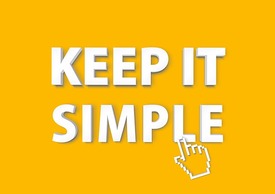 I've read (and edited) some very flowery corporate language in my career. There is a misperception that using "business-speak" is the appropriate, and effective, way to compose business communications. Unfortunately, there is also a misperception that business writing full of jargon and buzzwords makes the writer, and thus the employer, appear more educated and experienced. Um...NO!
Consider this: people are overwhelmed with information, and you have only 10-20 seconds to capture a reader's attention. Writing as The Word Doctor, which of these is most likely to get my point across - and quickly? "I am a woman who robustly and effectively visually reviews material which has been written by those enterprising business owners wishing to appear best-of-breed vis-à-vis those who will engage them." vs. "I edit copy written by business owners who want to connect effectively with their clients and prospects." Avoid corporate jargon and overused phrasing. Write and speak from your heart, authentically, in the style most natural for you. Those relationships, those connections are how you communicate effectively! Here's a wonderful article which goes into more detail on this topic.
0 Comments
 Words are nothing more than spoken collections of sounds, or written collections of letters (symbols). Both the sounds and letters are representations of our world - they have no meaning except what we have ascribed to them over time. If you know me and my work, you know that I keenly sense the energy behind the words I read and write. This energy IS the meaning. We speak or write with intent to communicate a thought, idea, emotion. The old childhood saying, "sticks and stones may break my bones..." is a falsehood. Bones heal, but words can cause lasting and great harm when the intent - the energy - is based in force, anger, fear, or any other "negative" emotion. And words can be a healing balm when the intent is based in love and kindness. Want an example? Easy - look at any social media post. That post is a digitally rendered and delivered collection of symbols which represent the intent - again, the energy - of the writer. If the writer portrays himself/herself as a kind, loving soul, but posts divisive, angry, or hateful thoughts, then the writing is inauthentic. It is incendiary. The reader engaging with that post will take on a degree of the expressed emotion - they sense the anger, whether they're aware of it or not, and that energy may stay with them for some time. This is the power of words in any format...a blog post, social media post, article, book, poem...to harm or heal, to educate or influence, to create love or fear. Use them wisely.  That is an interesting word - realize. It has so many subtle meanings. The suffix "ize" has come to mean to make, or to render...
So realize can be understood as "to make real," right? Think about it. When you realize something, you become aware of it. So in a very real sense (pun intended), you are making it REAL. If you're following The Word Doctor, you likely know that not only do I have a great love of words, but also of co-creating our lives with God/Universe/Higher Power. So, when you suddenly obtain awareness or knowledge and REAL-ize it, you are in a very true sense changing your world. Not only do your thoughts and ideas change, but with that energy shift, so does your world. So, real-ize this: you are capable of great things. Your words literally change your life, your world, and the worlds of those who read or hear those words. The ideas and knowledge you share become real in the lives of your readers and followers. This is why I am so aware of the need, as an editor, to make sure that your words are not just accurate, but also authentic to you, aligned with your who-you-are-ness. So, realize your greatness, and share it!  As I write this post, it's Christmastime in the year 2020. Time for holiday-themed emails, greeting cards, and gifts. The Word Doctor is getting involved by providing this valuable public service: holiday composition etiquette! Let's begin with possessive vs. plural. Seasons greetings - nope...not plural! Season's greetings - greetings of the season, possessive. Likewise, Happy holiday's - incorrect! the apostrophe indicates possessive. Happy holidays - correct! Plural holidays. Merry Christmas from the Smith's - incorrect, unless you include the word "house." Merry Christmas from the Smiths - correct...ALL the Smiths! Happy New Years - incorrect in several ways. Years is plural, so unless you're sending greetings intended to last for several years, that's just wrong. We're talking about just this coming new year! And likewise, Happy New Year's is wrong unless you include the word "day." Happy new year's day is correct. And as for capitalization, for most greetings standard sentence capitalization applies - only the first word. Happy new year! Season's greetings! Happy holidays! The exception is Christmas - Merry Christmas, because the word Christmas is always capitalized. Now you're all set to go forth and dazzle associates and friends with your grammar acumen!  A little over a year ago, I was introduced to my new best friend in business...Asana...and now I'd like to introduce you so you can be friends too! Asana is a fabulous project-management tool that streamlines everything for a project of any kind. You create tasks, assign due dates and who is to handle each task, add notes, and upload files. I love the fact that it helps create sequence in a multi-step project with a lot of moving parts. Asana has hugely helped organize a couple of teams I'm on and I'm singing its praises in every business setting! Let's say you are writing a book. You set goal due dates for each chapter, outline the assistance you'll want (tasks for an editor, publisher, marketing firm), store all the details like working title and subtitle, perhaps a character "tree." You're reminded through email when a task is due so you never lost sight of the goal! Or perhaps you are excited to host an event. Create sections within the project for each aspect (registration, presenters, marketing, venue, etc.), assign tasks within those sections along with due dates, keep track of emails and communications with those involved. Another example: you're planning a huge holiday dinner party. Get organized by planning with Asana! Get reminders when shopping is due, or a particular dish must be started, or who's bringing the green bean casserole. I recommend checking out the possibilities with this fabulous organizational tool! https://app.asana.com/  Usually the first exposure your prospective clients have to you and your services is online. Whether through a website, social media profile, or a published article, the content, style, and clarity of your writing is critical to communicating authentically who you are and what you offer. So why is it so important that your online presence be error-free? According to Agility PR Solutions, the bounce rate on landing pages with sloppy spelling and grammar is 85 percent more than those that were correctly written and spell-checked. Readers are immediately turned off by errors, and only rarely stay on your site once they've seen the errors. Imagine what they think of you and your services! In addition, Google search results are skewed further because typos make your site or your profile less visible and therefore in a far lower position in search results. If you are not good at grammar, punctuation, and/or spelling, solutions are available. You can still connect authentically and accurately with those you're trying to communicate with. I recommend using ALL of these for optimal results.
Whatever solution you choose, make it part of your system or routine to have other eyes review your writing so you can attract those clients who need what you offer!  In a conversation with a new friend yesterday, the topic of boundaries came up. We were discussing how important and satisfying it is to focus our energy in our businesses on those clients that really "feed" us...those with whom we feel the most connection. How often have you had a conversation with a new acquaintance or potential client that felt a bit "off"? Something about the connection didn't quite fit, rather like a jigsaw puzzle piece that was not cut correctly. Rather than bashing the piece with a hammer to MAKE it fit, it's wiser to leave it out. And with a potential client, it's wiser to politely decline to provide service. It's so important to "respect your no" when you know you're not the best person to offer service to someone. We often joke about saying to others, "What part of NO didn't you understand?" But we're often too ready to disrespect our own boundaries! The same applies to your tasks. How often do you take on a project or task that makes you feel "off" the same way? Perhaps you really don't have the time or inclination to take care of it. Perhaps it's something you don't have the expertise or experience to handle properly. Why then take that hammer to it and force yourself? There's always someone to delegate to! When I first started my business many years ago, I would provide any service to any client, as long as they'd pay me. Over time I realized I was not honoring the best in myself, or in my clients, and began to politely say "no" to certain tasks and certain people. If you don't enforce your own boundaries, then who will? How can you expect others to respect your "lines in the sand" if you don't yourself? Remember, we always show others how to treat us...and your intention to violate your own rules means you're showing the universe that's just fine. Expect the best from yourself, and FOR yourself!  In the years I've been editing publications (e-books, print books, PDFs, and more) I've learned there are key tools for success for any author who is working with an editor. Feel free to share this post and use it as a checklist!
Following these "best practices" will go a long way toward helping you and your editor create a polished final product, and on time! If you're new to business, or getting your feet wet as an entrepreneur, you may not have direct experience with delegating work. But you can get inspiration from the world around you and learn how.
If you've ever worked outside the home in any capacity, you'll likely have been on the "providing" end of delegation. Your supervisor assigned tasks to you; he or she was assigned tasks by his or her supervisor, and onward up the chain of command. Anywhere you go, you're seeing the results of delegation, sometimes effective and sometimes not so much. You stop at a restaurant for lunch - there's a head cashier, a head waiter, and a restaurant manager. The plant that manufactured your furniture has a chain of command...and a quality control team. That PTA you're a member of has committees and positions and committee chairs. When you're a solo-preneur, you may think you don't have anyone to delegate to. But now more than ever, that is incorrect. There are countless Virtual Assistants ready to help (check out EliteVirtualAssist, my favorite), as well as freelancers like me who specialize in a variety of skills and talents. You can find a someone to whom to delegate just about any task. And of course, The Word Doctor is always here to help you present the most effective window to the online world, by providing editing and proofreading support, marketing communications, and more. Remember, for every task you outsource, your time expands to allow you to accomplish so much more, effectively and accurately!  Ask yourself where your prospects are most likely to find you. Where your clients have found you. Online, right? Whether your business has a physical location or not, Google (still the most-used search engine) will direct people to your social media profiles, your online listings, and your website...and usually all of those. Take a field trip and wander around a shopping district or mall where you live. Enjoy window shopping...peruse the wares of the shops in the area. What draws you in? What entices you to enter the store? Well, usually it's what you see on display, and how it's displayed. You feel a connection that moves you to open the door to explore further. Your website (or your social media page if you don't have a website) is your non-physical business's front window. You want it to be attractive, to accurately show what you offer, to be welcoming. A good way to get some feedback on your site is to ask a couple of friends who don't know much about your work to review it in detail. What draws them in? What entices them to click to explore the site? With what do they feel a connection? Take an objective look at your site yourself. What does your home page (the front window) say about you? What pages do you include? What images? What links? Are you including everything a first-time reader would need to know and understand about you and your work? Are you offering important take-aways? And key point...does the site represent you accurately, authentically? If your home page is full of run-on sentences and poor grammar, your prospect is going to go elsewhere, no matter what goodies you offer. There's a solution! The Word Doctor offers a helpful service to ensure your site or page IS accurate and authentic. I'll take a detailed look at your wording and layout to ensure it's the best it can be. (More info here.) Keep your front window fresh and clean, and entice more customers to enter! |
 RSS Feed
RSS Feed
